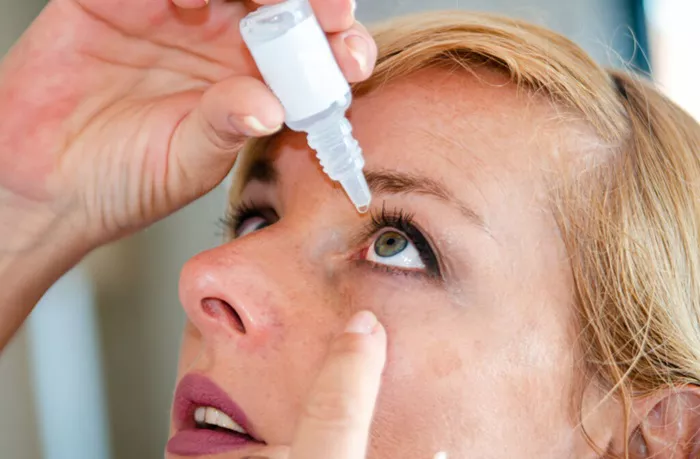A groundbreaking new prescription eye drop, Vuity, is providing a promising alternative for people with presbyopia, a common age-related condition that affects close-up vision. Recently approved by the Food and Drug Administration (FDA), Vuity has garnered attention from ophthalmologists who believe it may reduce the need for reading glasses, which many people find cumbersome.
Presbyopia typically impacts individuals over the age of 40, as the eye’s lens loses flexibility and makes focusing on nearby objects increasingly difficult. Everyday tasks like reading text messages, examining menus, or using a computer can become a struggle when objects appear blurry.
While reading glasses have been the traditional solution, they are not always practical for those who frequently alternate between focusing on nearby and distant objects. Vuity presents a potential remedy by improving near vision without the need for additional eyewear.
Dr. Ella Faktorovich, an ophthalmologist at the Pacific Vision Institute, sees Vuity as a significant advancement. “Reading glasses can be frustrating to keep track of,” she states. “With these drops, within 15 minutes, you can clearly see your phone, your computer, and improve your overall range of vision.” The quick enhancement of near vision is a game-changer for many, Dr. Faktorovich adds.
The drop works by temporarily altering the eye’s focusing ability. Its active ingredient causes the pupils to contract, resulting in a pinhole effect that expands the depth of focus. This allows users to see objects up close clearly while maintaining their distance vision.
Although other similar eye drops are still undergoing clinical trials, Vuity is the first to earn FDA approval, marking a major milestone in the fight against presbyopia.
For individuals who spend extensive time reading or working on screens, Vuity’s benefits are especially appealing. Lovester Law, a writer frequently affected by eye strain, is keen to see how the drops may help. “After long periods of reading or writing, I just have to close my eyes and rest,” he explains. “Our eyes inevitably age, and they don’t work like they used to.” For people like him, the possibility of reducing eye fatigue without glasses is a welcome development.
However, Vuity is not a one-size-fits-all solution. An ophthalmologist consultation is crucial to determine if the drops are right for an individual. Vuity is available by prescription only, and a thorough eye exam is necessary to assess compatibility.
Individuals with specific eye conditions or those who need impeccable near vision for detailed tasks may need to explore other options. Nevertheless, doctors, such as those at UCSF, view Vuity’s approval as part of a broader shift in the treatment of presbyopia.
Julie Schallhorn, Associate Professor of Ophthalmology at UCSF, is optimistic about the future. “The data we have shows that it really works,” she says. “It is an exciting time to be in this field, and an exciting time for our patients.”
The Science Behind Vuity: Clinical Trials and Approval
FDA approval for Vuity came after the successful completion of two pivotal Phase 3 clinical trials, GEMINI 1 and GEMINI 2. These studies evaluated Vuity’s efficacy, safety, and tolerability in treating presbyopia, with 750 participants aged 40 to 55. Participants were randomly assigned to either Vuity or a placebo group and instructed to use one drop in each eye daily.
The main goal of the trials was to determine whether Vuity users could read three additional lines on a reading chart under low light conditions without sacrificing more than one line of distance vision. Both trials achieved their primary endpoints, demonstrating statistically significant improvements in vision for Vuity users.
The trials also reported no serious adverse events, with mild side effects, such as headaches and eye redness, experienced by more than 5% of participants.
Understanding Presbyopia: What You Need to Know
Presbyopia is an age-related condition that affects almost everyone, typically beginning around age 40. As the lens of the eye becomes less flexible, it becomes harder to focus on close-up objects. Early signs of presbyopia include the need to hold reading materials farther away to see them clearly, along with blurred vision, eyestrain, and headaches after engaging in close-up tasks.
If you are experiencing these symptoms, it’s important to consult with an eye doctor, who can diagnose presbyopia and discuss treatment options. For some individuals, sudden vision changes may require immediate medical attention. Signs like sudden loss of vision, flashes of light, or double vision should prompt emergency care.
Related topic:
10 Eye Exercises and Habits to Boost Vision Health
Doctors Urged to Lead Healthcare’s Future at BW Summit
Dhananjay Munde Skips Cabinet Meeting Due to Eye Surgery

